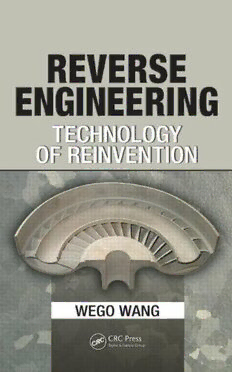Download Reverse Engineering: Technology of Reinvention PDF Free - Full Version
Download Reverse Engineering: Technology of Reinvention by Wego Wang in PDF format completely FREE. No registration required, no payment needed. Get instant access to this valuable resource on PDFdrive.to!
About Reverse Engineering: Technology of Reinvention
The process of reverse engineering has proven infinitely useful for analyzing Original Equipment Manufacturer (OEM) components to duplicate or repair them, or simply improve on their design. A guidebook to the rapid-fire changes in this area, Reverse Engineering: Technology of Reinvention introduces the fundamental principles, advanced methodologies, and other essential aspects of reverse engineering. The book’s primary objective is twofold: to advance the technology of reinvention through reverse engineering and to improve the competitiveness of commercial parts in the aftermarket. Assembling and synergizing material from several different fields, this book prepares readers with the skills, knowledge, and abilities required to successfully apply reverse engineering in diverse fields ranging from aerospace, automotive, and medical device industries to academic research, accident investigation, and legal and forensic analyses. With this mission of preparation in mind, the author offers real-world examples to: Enrich readers’ understanding of reverse engineering processes, empowering them with alternative options regarding part production Explain the latest technologies, practices, specifications, and regulations in reverse engineering Enable readers to judge if a "duplicated or repaired" part will meet the design functionality of the OEM part This book sets itself apart by covering seven key subjects: geometric measurement, part evaluation, materials identification, manufacturing process verification, data analysis, system compatibility, and intelligent property protection. Helpful in making new, compatible products that are cheaper than others on the market, the author provides the tools to uncover or clarify features of commercial products that were either previously unknown, misunderstood, or not used in the most effective way.
Detailed Information
| Author: | Wego Wang |
|---|---|
| Publication Year: | 2010 |
| ISBN: | 9781439806302 |
| Pages: | 342 |
| Language: | English |
| File Size: | 10.535 |
| Format: | |
| Price: | FREE |
Safe & Secure Download - No registration required
Why Choose PDFdrive for Your Free Reverse Engineering: Technology of Reinvention Download?
- 100% Free: No hidden fees or subscriptions required for one book every day.
- No Registration: Immediate access is available without creating accounts for one book every day.
- Safe and Secure: Clean downloads without malware or viruses
- Multiple Formats: PDF, MOBI, Mpub,... optimized for all devices
- Educational Resource: Supporting knowledge sharing and learning
Frequently Asked Questions
Is it really free to download Reverse Engineering: Technology of Reinvention PDF?
Yes, on https://PDFdrive.to you can download Reverse Engineering: Technology of Reinvention by Wego Wang completely free. We don't require any payment, subscription, or registration to access this PDF file. For 3 books every day.
How can I read Reverse Engineering: Technology of Reinvention on my mobile device?
After downloading Reverse Engineering: Technology of Reinvention PDF, you can open it with any PDF reader app on your phone or tablet. We recommend using Adobe Acrobat Reader, Apple Books, or Google Play Books for the best reading experience.
Is this the full version of Reverse Engineering: Technology of Reinvention?
Yes, this is the complete PDF version of Reverse Engineering: Technology of Reinvention by Wego Wang. You will be able to read the entire content as in the printed version without missing any pages.
Is it legal to download Reverse Engineering: Technology of Reinvention PDF for free?
https://PDFdrive.to provides links to free educational resources available online. We do not store any files on our servers. Please be aware of copyright laws in your country before downloading.
The materials shared are intended for research, educational, and personal use in accordance with fair use principles.

